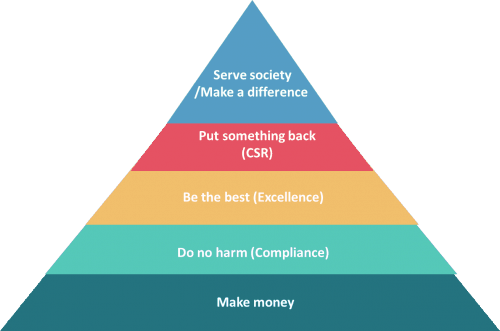The Place for Big Business in Social Issues
When you consider big business, creative social solutions isn’t exactly the first thing to come to mind. In Michael Porter’s TED Talk The Case for Letting Business Solve Social Problems, Porter highlights many points that are extremely relevant in our present society. Historically, business has been viewed as the producers of social issues in the world, whether it be the fast food industry, extraction industries, drugs,… the list goes on, and that there is a trade-off between social and economic performance. To deal with this taboo, people relied upon, and trusted, governments, NGOs, and philanthropic organizations to go to battle with these corporations. While these methods may seem good in theory, they simply lack the capital and the resulting scale-ability to have a broad enough impact. As Porter says: “all wealth is… created by business” and business “[meets] needs at a profit.” As we have touched on in-class, it actually saves businesses money to be more socially and environmentally conscious as pollution, accidents, and poor employee health are taxing on corporations. Shared value, as Porter notes, is addressing a social issue with a business model – a “higher kind of capitalism.” Governments and NGOs working with businesses will enable the shared value of business and repair society’s perception of these institutions.
Social issues can further be tackled by business through a strong brand purpose. Liz Tinlin describes purpose as the “big, compelling idea at the centre of your brand,” winning over the hearts and minds of consumers. I believe that if a brand has a strong purpose for its business, this will be the guiding light for decision making. While businesses rely on profit to maintain operations, many find it easy to renege on its values. This can backfire, especially when there is a large consumer base that firmly believes in a company’s mission. Continuing forward, strategies for implementing values into the corporation and its practices are necessary for creating this shared value and making a real impact with business.
Title image: http://www.blueprintforbusiness.org/purpose/

Thanks for this post, Brodie.
I find it very reassuring that someone with such widespread influence as Michael Porter is talking about these things. When thinking about sustainability it can be a lot of doom and gloom — will we keep the planet’s temperature from warming that critical 2ºC? And if not, will we be able to adapt to the drastic changes it will mean for us?
But I find that the more I learn about it, the more optimistic I actually become. Tesla just surpassed GM as the most valuable carmaker in the US (based strictly on stock prices, not output…). There are more green energy jobs than coal jobs in North America.
The tide is turning. Companies are changing their train of thought, and not a moment too soon. I never thought I’d say this, but I believe that businesses are going to be the beacons of hope that we need to move forward.